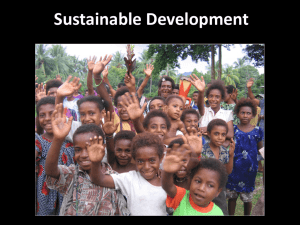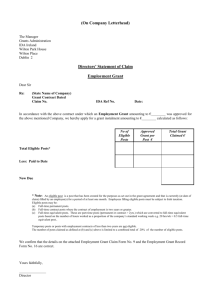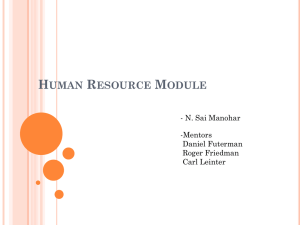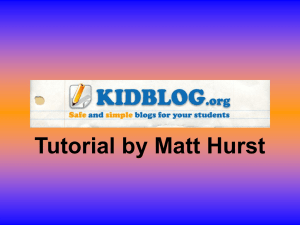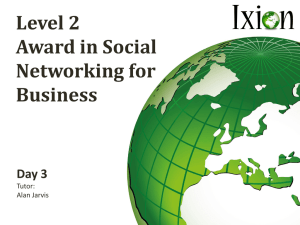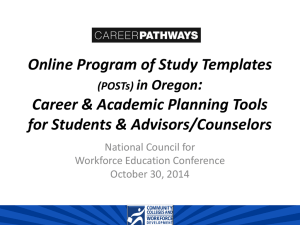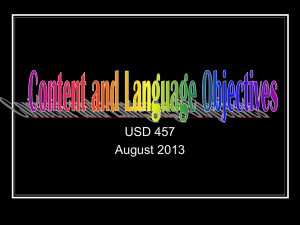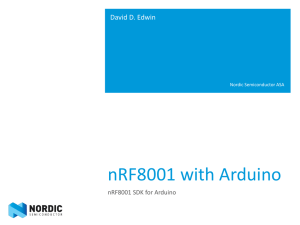Presentation by Jānis Kārkliņš
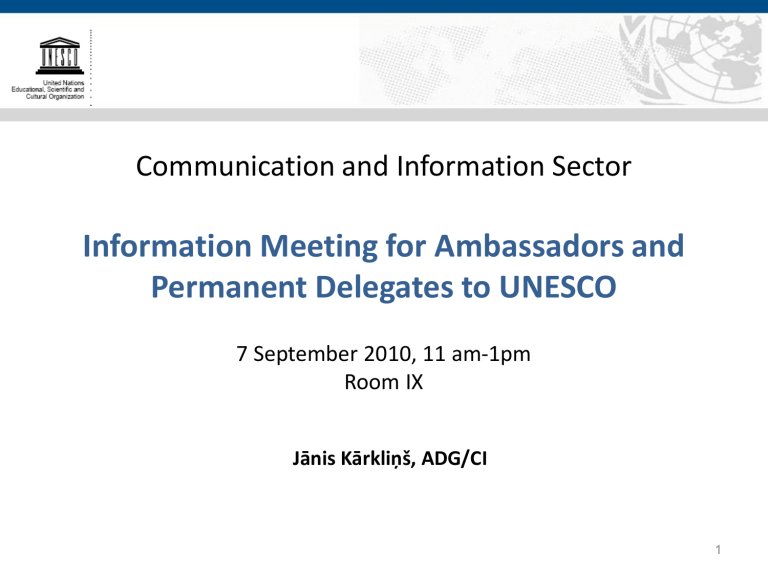
Communication and Information Sector
Information Meeting for Ambassadors and
Permanent Delegates to UNESCO
7 September 2010, 11 am-1pm
Room IX
Jānis Kārkliņš, ADG/CI
1
Information Meeting for Ambassadors and
Permanent Delegates to UNESCO
• Welcome of Delegates and invitees, and presentation by Jānis Kārkliņš ,
Assistant Director-General for Communication and Information
• Presentation by Mogens Schmidt , Deputy Assistant Director-General for
Communication and Information, and Director of the Division for Freedom of
Expression, Democracy and Peace
• Presentation by Wijayananda Jayaweera , Director of the Communication
Development Division
•
Presentation by Indrajit Banerjee , Director of the Information Society Division
• Open for questions and answers
2
Major Programme V:
Overarching Objective
Inclusive Pluralistic
Building inclusive knowledge societies through communication and information
Equitable Open
3
Communication and Information
Empowering people through the free flow of ideas and by access to information and knowledge
4
CI’s mission: to assist Member States in the achievement of internationally agreed development goals and commitments
Freedom of expression
Freedom of information
Development of communication
Dialogue
Development
Access to information and knowledge
Democracy
5
CI flagship activities and projects
World Press Freedom Day/ Guillermo Cano WPF Prize
Intergovernmental Programme for the Development of
Communication (IPDC )
UNESCO Media Development Indicators
Building centres of excellence in journalism education
Memory of the World Programme
World Digital Library initiative
Follow-up and implementation of WSIS outcomes in light of
2015 review
Use of ICTs in education and science (including ICT CFT)
Information for All Programme (IFAP )
6
CI at Headquarters
Executive Office
(including AO/UCE/IKM)
6 Professionals
(incl. vacant P5 & P1/P2)
10 GS staff
Assistant Director-General for Communication and Information
1 ADG
3 GS staff (incl. vacant G4)
Division for Freedom of Expression,
Democracy & Peace
1 Director
6 Professionals,
3 GS staff
Communication
Development
Division
1 Director
7 Professionals
1 Associate Expert
5 GS staff (incl. vacant G3)
Information
Society
Division
1 Director
12 Professionals
(incl. Vacant P5, and 3 x P4)
2 Associate Experts
5 GS staff
Total 64 staff members: 38 Professionals (incl. 3 Associate Experts) and 26 General Service staff
7
AFRICA
ACI posts:
*Accra
Addis Ababa
Dakar
*Harare
Nairobi
Windhoek
*Yaoundé
NPO posts:
Bamako
Bujumbura
Dar es Salaam
*Kinshasa
Libreville
ARAB STATES
ACI posts:
Cairo
Rabat
Ramallah
Baghdad
(special assignment until 2011)
NPO posts:
Amman
Beirut
Doha
CI in the Field
Sector in 34 UNESCO Offices
20 Advisers for Communication & Information (ACI)
16 National Programme Officers (NPO)
ASIA/PACIFIC
ACI posts:
Apia
Bangkok
*Beijing
*Jakarta
*New Delhi
Tehran
NPO posts:
Almaty
New Delhi
*Islamabad
(3 emergency temp posts)
Associate expert:
Kathmandu
EUROPE &
NORTH
AMERICA
NPO posts:
*Moscow
New York
(shared with BPI/ERC)
* Vacant Posts
LATIN AMERICA
& CARIBBEAN
ACI posts:
Kingston
Montevideo
Quito
San Jose
NPO posts:
Brasilia
Havana
Kingston
8
Major Programme V: Budget Breakdown
Regular Budget
Main Line of Action
Activities
$
Personnel
$
MLA 1:
Promoting freedom of expression and access to information
4 326 000 5 750 600
MLA 2:
Strengthening free, independent and pluralistic media and communication for development
MLA 3:
Fostering universal access to information and knowledge and the development of infostructures
TOTAL Major Programme V ($)
4 391 400
4 391 400
6 483 900
7 814 700
13 108 800 20 049 200
Total 35 C/5
Approved
$
10 076 600
10 875 300
12 206 100
Extrabudgetary resources
8 132 500
7 079 900
68 111 300*
33 158 000 83 323 700
9
Distribution of Funds
Decentralization of the Regular Programme Activities
Budget by Implementing region
Asia & the Pacific
15.7 %
Headquarters
45.9% Africa
17.7%
Arab States
6.9 %
Latin America &
Caribbean
11.8%
Europe and North
America
2 %
10
Accents in CI’s activities for next 12-18 months
• Enhanced engagement with Member States
• Mainstreaming gender issues within CI programs
• Promotion of freedom of expression on the Internet
• Ethical and Professional Standards in Journalism
• Promoting community media and fostering Community multimedia centres (CMCs)
• Strengthening of the Memory of the World programme
• Revisiting the UNESCO Charter on the Preservation of Digital Heritage
• Streamlining WSIS follow-up and implementation activities in the light of the 2015 review
• Increased intersectoral cooperation with all UNESCO Sectors
• Seeking EXB funds for CI programme activities and projects
11
Thank you
12


